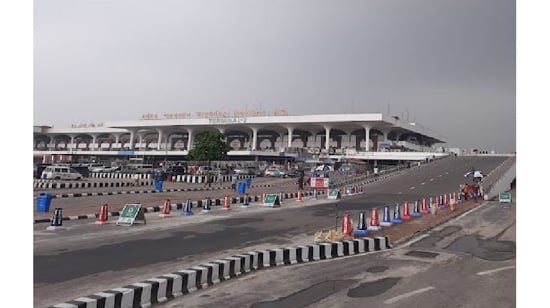The authorities of the Hazrat Shahjalal International Airport (HSIA) have started screening the temperatures of the inbound passengers to check if they are affected by monkeypox virus.
It comes as the the World Health Organization (WHO) on Wednesday issued a global public health emergency on Mpox or monkeypox.
HSIA Executive Director Group Captain Kamrul Islam said the authority is screening arrival passengers with the ‘Thermal scanner archway’ and if required travellers with symptoms will be sent to Kurmitola General Hospital, Infectious Diseases Hospital (IDH) and Kuwait Bangladesh Maitree Hospital.
In this connection, Dhaka airport authorities on Friday held a meeting amid WHO’s declaration of a global health emergency in response to the upsurge of cases of Mpox.
Officials of Civil Aviation Authority of Bangladesh (CAAB), Communicable Disease Control (CDC)a unit of Directorate General of Health Services (DGHS), HSIA health department and airlines joined the meeting.
Airlines were asked to remain alert and inform the health department promptly in case of any passenger with the symptoms.
Besides, passengers are requested to call 10655 in case of any symptoms developing within 21 days of arrival.
Meanwhile, the Directorate General of Health Services (DGHS) has advised contacting 16263 or 10655 if symptoms of Mpox appear.
Mpox (monkeypox) is an infectious disease caused by the monkeypox virus. It can cause painful blisters, swollen lymph nodes, and fever, the DGHS said in a press release on Saturday.
The release said mpox has spread to many countries around the world, including the Democratic Republic of the Congo, Burundi, Rwanda, Uganda, and Kenya.
"If someone shows symptoms, comes into contact with an infected person, or develops symptoms within 21 days of travelling to an infected country, please contact 16263 or 10655," the release reads.
Monkeypox transmits through close physical contact, including sexual contact, but unlike previous global pandemics such as Covid-19 there is no evidence it spreads easily through the air.
It causes flu-like symptoms, skin lesions and can be fatal, with four in 100 cases leading to death.
Outbreaks can be controlled by preventing infections with vaccines, though these are usually only available for people at risk or those who have been in close contact with an infected person.
There are two main types of mpox - Clade 1 and Clade 2.
A previous mpox public health emergency, declared in 2022, was caused by the relatively mild Clade 2. However, this time it is the far more deadly Clade 1 - which has killed up to 10% of those getting sick in previous outbreaks - that is surging.














-20260226080139.webp)





-20260225072312.webp)








-20260219054530.webp)
-20260224075258.webp)





-20260221022827.webp)